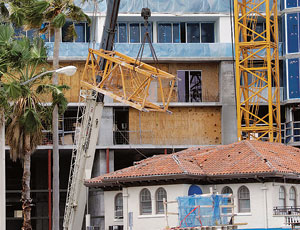Crane accidents this year have caught the attention of construction executives, leading them to tighten up their internal hoisting policies. Key strat�egies include mandatory, independent inspections, worker certification and new communication technology. Private contractors are phasing in new certification requirements for operators as well as workers on the ground. Starting in January 2009, New York City-based Turner Construction Co. plans to require all tower-crane operators on its projects to hold a nationally accredited certification. �We felt that as far as tower cranes go, we had a lot more work to do out there,� says Cindy DePrater, the company�s Dallas-based corporate safety director. Turner does not operate cranes but plans to stipulate this need in subcontractor agreements. Mandatory mobile-crane licenses may follow later on, DePrater adds.

On Nov. 15, general contractor Flintco Inc. hosted the industry’s first standardized test for crane signalers, produced by the National Commission for the Certification of Crane Operators. The Tulsa, Okla.-based builder helped NCCCO develop the program, consisting of a one-hour written exam and 20-minute practical exam administered on a computer. Training and testing to a uniform standard will help Flintco prevent accidents and improve production, says Shawn Cosby, corporate trainer. Twelve candidates took the test. When NCCCO rolls out rigging tests next year as planned, it is expected to round out Flintco’s policy of testing operators and signalers. “Three sets of eyes for every hazard is so much better than one,” says Cosby, who worked as a crane operator in the oil fields, where he says petroleum employers have adopted zero-accident policies. “If one guy got hurt, it was a failed project,” he explains. “They said, ‘These are the rules; if you break them, you’re gone.’ The paychecks were really good, and most folks conformed.”
Flintco is not requiring subs to be certified because the program is still too young, executives say. “It would be crazy to try to hold everybody to this when we’re not even certified,” says Tom Heffernan, vice president of field operations. However, Flintco will help train subs and assist them with crane signals during lifts. Contractors are trying to get a jump on future regulations. Operator licenses are required by a growing number of states and cities, though a pending Occupational Safety and Health Administration rule would implement it nationwide. (ENR 11/3-10 p. 28). “We didn’t want to wait for the standards to come out,” says DePrater, who notes that experience requirements may also come, but contractors are still evaluating what they should be. “We are hearing anything from 1,600 hours on up,” DePrater says.
Technology is yet another strategy. This month, Bovis Lend Lease U.K. started installing wireless communication devices on tower cranes in London. The system uses Bluetooth, a hands-free headset for operators and signalers, cameras mounted on the crane’s jib and a black-box recorder. “It avoids the potential dangers of blind lifts,” says Bovis spokeswoman Caroline Massey. Like Turner, Bovis does not operate cranes but is requiring these devices on subs’ equipment. Catching mechanical failure is another key area. Turner has a policy of hiring an independent inspector to scrutinize tower cranes before they are put into service. Earlier this year, it also began a special quarterly inspection of subs’ equipment to weed out bad rigging. In September, auditors examined 12,000 items and trashed 1,000. Depending on the type of gear, deficiency rates fell between 3% and 11%. “That’s a big deal considering we’re not the experts,” DePrater says. Nationwide, Turner manages about 1,600 projects annually.
Crane subs welcome the oversight but worry that the quality of inspectors “runs the entire spectrum,” says Peter Juhren, service manager at Morrow Equipment. The Salem, Ore.-based supplier is evaluating its own internal policies while facing $65,250 of OSHA fines, including a “willful” violation for allegedly failing to follow manufacturer specifications in a March 25 accident in Miami that killed two. Bovis Inc., which ran the job, faces a $7,000 fine. The companies say they are contesting the fines but decline further comment.


Post a comment to this article
Report Abusive Comment